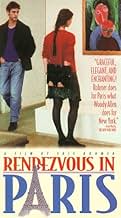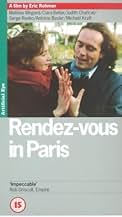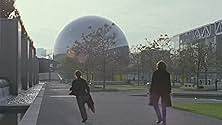Les rendez-vous de Paris
- 1995
- Tous publics
- 1h 38min
NOTE IMDb
7,2/10
2,7 k
MA NOTE
Ajouter une intrigue dans votre langueThree stories of love and coincidence around the theme of dates in Paris.Three stories of love and coincidence around the theme of dates in Paris.Three stories of love and coincidence around the theme of dates in Paris.
- Récompenses
- 2 nominations au total
Avis à la une
This little film (actually 3 separate films) looks as if it was shot as a college film school thesis. The characters all seem to be students, academics, and artists, exactly the kind of people who populate such films! The characters don't seem to be experiencing any romantic epiphanies, either, but rather the filmmaker seems to be exploring the kind of questions of how-do-you-fall-in-love-and-who-with that are so ... collegiate.
I found it mildly diverting; my wife found it a good cure for her insomnia.
As a travelogue, it provides a great tour of the parks of Paris, and glimpses of the Metro and city streets.
I found it mildly diverting; my wife found it a good cure for her insomnia.
As a travelogue, it provides a great tour of the parks of Paris, and glimpses of the Metro and city streets.
It 's not that the actress in the movie is beautiful, but that every woman in Paris looks good. Such a simple and romantic story can only be seen in Eric Rohmer 's movie.
Eric Rohmer's Les rendez-vous de Paris brought back so many memories from my first summer in Paris, at the age of twenty-six. In my experience, the place was teeming with dragueuers, and the scenes and locales of this film are all familiar, reminding me of how intrinsically social French society is.
I have to wonder how Parisians are faring through the Coronapocalypse. No more double and quadruple social kissing, Je suppose. C'est triste, un peu. I cannot really imagine Paris filled with masked people moving to the other side of the street upon sighting another person. And yet, here we are. I hope that Paris recovers.
I have to wonder how Parisians are faring through the Coronapocalypse. No more double and quadruple social kissing, Je suppose. C'est triste, un peu. I cannot really imagine Paris filled with masked people moving to the other side of the street upon sighting another person. And yet, here we are. I hope that Paris recovers.
What is love? and can you explain it. Using three meetings at different locations , Rohmer creates a parable on the intricate and surprising nature of love. The first story about a rendezvous at seven is the best. Insidious in its nature, it plants the seeds of doubt that blossom into the tale of two women and two men, each seeking and expecting divergent results. Filled with coincidences, all three tales are, it presents the surprises we don't see coming.
The second story which is kind of dull or more demanding depending on taste, follows a couple meeting up in many public locations. The female character is afraid to meet in private despite the urgings of her male lover and when she does make the leap, the consequences will forever change the relationship.
The goat of the pack is the final vignette, a story titled after a Picasso painting that features prominently in story. Again the obvious is pushed aside for the unexpected and there is a certain breezy, plush ending to the proceedings that seems to jar with what has become.
A comedy in three parts, there is a chorus group that is interspersed and opens each story. Cherubic in nature, the songs present certain adages on the nature of love and life.
A mixture of his moral tales with his comedies and proverb series, it is the lesser of each but sub-par Rohmer is still superior to most filmmakers. His low frills style of film making which a previous reviewer called cheap tells him how little he knows about the edict of the French New wave, the only die-hard adherent remained Rohmer, his rules, a quantifier closer to the Dogma'95 tradition of cinema. It is cinema of the heart at its finest.
The second story which is kind of dull or more demanding depending on taste, follows a couple meeting up in many public locations. The female character is afraid to meet in private despite the urgings of her male lover and when she does make the leap, the consequences will forever change the relationship.
The goat of the pack is the final vignette, a story titled after a Picasso painting that features prominently in story. Again the obvious is pushed aside for the unexpected and there is a certain breezy, plush ending to the proceedings that seems to jar with what has become.
A comedy in three parts, there is a chorus group that is interspersed and opens each story. Cherubic in nature, the songs present certain adages on the nature of love and life.
A mixture of his moral tales with his comedies and proverb series, it is the lesser of each but sub-par Rohmer is still superior to most filmmakers. His low frills style of film making which a previous reviewer called cheap tells him how little he knows about the edict of the French New wave, the only die-hard adherent remained Rohmer, his rules, a quantifier closer to the Dogma'95 tradition of cinema. It is cinema of the heart at its finest.
Eric Rohmer usually explores with exceptional psychological talent what is in the minds and hearts of ordinary people in what concerns love relations. In his movie people reflect and talk thoroughly about what they feel (or suppose they feel) in what regards those relations and live apparently superficial events although very meaningful and sometimes unexpected and surprising. In this movie the first two stories are about love and infidelity treated in a humorous way without prejudice of their psychological depth. Human beings are like that and they not always realize what they really feel. The third story is of love and infatuation, of illusion and disillusion when you think that because you love someone, automatically the loved one also loves you which seldom is true. The city of Paris atmosphere where the three stories take place is particularly favourable to such sentiments and situations for its romantic urban environment. We have then here the usual Rohmer's characters: authentic human beings somewhat doubtful about their feelings and thoughts (though they sometimes suppose they are certain about that) who now and then have to face situations for which they were not prepared. Not very dramatic but not superficial anyway.
Le saviez-vous
- AnecdotesWhile at the Cimetiere St. Vincent, they visit the grave of Theophile Alexandre Steinlen who was a Swiss-born French Art Nouveau painter and print-maker.
Meilleurs choix
Connectez-vous pour évaluer et suivre la liste de favoris afin de recevoir des recommandations personnalisées
- How long is Rendez-vous in Paris?Alimenté par Alexa
Détails
Box-office
- Montant brut aux États-Unis et au Canada
- 730 099 $US
- Week-end de sortie aux États-Unis et au Canada
- 36 471 $US
- 11 août 1996
- Durée
- 1h 38min(98 min)
- Couleur
- Rapport de forme
- 1.37 : 1
Contribuer à cette page
Suggérer une modification ou ajouter du contenu manquant











